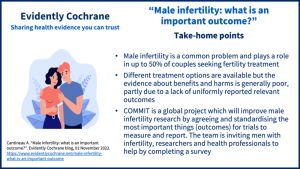In a blog for anyone interested in male infertility research, Astrid Cantineau, specialist in reproductive medicine, looks at the problem of poor evidence for treatments for male infertility and how COMMIT (Core Outcome Measures for Infertility TrialsClinical trials are research studies involving people who use healthcare services. They often compare a new or different treatment with the best treatment currently available. This is to test whether the new or different treatment is safe, effective and any better than what is currently used. No matter how promising a new treatment may appear during tests in a laboratory, it must go through clinical trials before its benefits and risks can really be known.), a global project, is working to change this by establishing what trials should measure. You are invited to tell researchers what you think is important to measure in a questionnaire.
Take-home points
Male infertility is caused by low or absent sperm production due to an underlying problem. Examples are genetic disorders, hormonal disorders or lifestyle choices. But there may also be no obvious history or signs that lead to the inability to conceive a child, which is called “unexplained male infertility”.
Male infertility is a contributing factor in up to 50% of couples seeking fertility treatmentSomething done with the aim of improving health or relieving suffering. For example, medicines, surgery, psychological and physical therapies, diet and exercise changes.. These are generally couples who have tried to conceive for at least 1 year. It is estimated that male infertility effects 18 million men globally.
What treatment options have been suggested?
Intrauterine insemination (IUI) and intra-cytoplasmatic sperm injection (ICSI) are fertility treatments offered in daily practice in most countries. However, which couple with male infertility is likely to benefit from an expectant management, starting with IUI, or be referred for IVF or ICSI directly is not clear. This is partly due to the lack of evidence on outcomesOutcomes are measures of health (for example quality of life, pain, blood sugar levels) that can be used to assess the effectiveness and safety of a treatment or other intervention (for example a drug, surgery, or exercise). In research, the outcomes considered most important are ‘primary outcomes’ and those considered less important are ‘secondary outcomes’. such as live births and adverse events (harms), as highlighted by the Cochrane Review Assisted Reproductive technologies for male subfertility (published February 2016).
Supplements are widely available and inexpensive when compared to IUI and IVF/ICSI. The use of these “anti-oxidants” might have a positive effect on sperm quality. The authors of the Cochrane Review Antioxidants for male subfertility (published May 2022) found that there are nearly 100 randomizedRandomization is the process of randomly dividing into groups the people taking part in a trial. One group (the intervention group) will be given the intervention being tested (for example a drug, surgery, or exercise) and compared with a group which does not receive the intervention (the control group). controlled trialsA trial in which a group (the ‘intervention group’) is given a intervention being tested (for example a drug, surgery, or exercise) is compared with a group which does not receive the intervention (the ‘control group’). (RCTs) comparing supplements with placeboAn intervention that appears to be the same as that which is being assessed but does not have the active component. For example, a placebo could be a tablet made of sugar, compared with a tablet containing a medicine. or no treatment. However, only 20 studies reported on clinical pregnancies and 12 studies on live birth. So many studies have been done, but due to a lack of relevant clinical outcomes we cannot answer the question whether it is helpful for male infertility yet.
Hormonal therapy has been suggested for unexplained male infertility to improve sperm quality, but large multicenter trials comparing endocrine therapies in male infertility with live births as an outcome are lacking. Therefore, international guidelines do not recommend these therapies (EAU Guidelines on sexual and reproductive health, chapter 10 Male infertility). The current Cochrane ReviewsCochrane Reviews are systematic reviews. In systematic reviews we search for and summarize studies that answer a specific research question (e.g. is paracetamol effective and safe for treating back pain?). The studies are identified, assessed, and summarized by using a systematic and predefined approach. They inform recommendations for healthcare and research. on this subject will be updated in 2023.
It is thought that lifestyle factors play a role in decreasing sperm quality. Unfortunately, there are no multicenter RCTs evaluating the effect of lifestyle interventionA treatment, procedure or programme of health care that has the potential to change the course of events of a healthcare condition. Examples include a drug, surgery, exercise or counselling. specifically in male infertility. The Cochrane Review Preconception lifestyle advice for people with infertility (published April 2021) highlights that the existing evidence of seven randomized trials is very uncertain about the effect of preconception lifestyle advice for people with infertility on live birth. DataData is the information collected through research. on other relevant outcomes such as pregnancy complications (e.g. fetal growth restriction) or data on time to pregnancy are lacking.
Improving research on male infertility
Patients, researchers and health professionals have worked together in a Priority Setting Partnership for Infertility, to decide what are the most important questions for researchers to work on. But for trials to be helpful, they need to measure the right things (outcomes) – such as the live birth rateThe speed or frequency of occurrence of an event, usually expressed with respect to time. For instance, a mortality rate might be the number of deaths per year, per 100,000 people., and to measure them in the same way. Without that, it’s difficult to combine trials and to be sure about the benefits and harms of a treatment.
Treatment outcomes need to be important to patients. For example, if sperm motility increases due to a treatment intervention, but the live birth rate is lower, you might not want to start it.
We can do something about this! Core OutcomeMeasures for Male Infertility Trials (COMMIT) is a global initiative led by researchers, clinicians and men with infertility to define a core set of outcomes which each trial should measure and report in their results.
What can you do to help?
We want to know what outcomes you think are important for future male fertility trials. We would like to hear from men with infertility, researchers and healthcare professionals. There is a two round online survey, which you can find here on this page which tells you more about COMMIT. It takes 20 minutes to complete. We appreciate your help!
Disclosure of interest: Astrid Cantineau is a member of the COMMIT initiative, a Cochrane authorSomebody responsible for preparing and, in the case of Cochrane Reviews, keeping up-to-date a systematic review. The term ‘reviewer’ is also sometimes used to refer to an external peer reviewer, or referee., and a researcher in the field of lifestyle, oxidative stress and male infertility at the University of Groningen.
Join in the conversation on Twitter with @CochraneCGF @CochraneUK or leave a comment on the blog.
Please note, we cannot give specific medical advice and do not publish comments that link to individual pages requesting donations or to commercial sites, or appear to endorse commercial products. We welcome diverse views and encourage discussion but we ask that comments are respectful and reserve the right to not publish any we consider offensive. Cochrane UK does not fact check – or endorse – readers’ comments, including any treatments mentioned.



